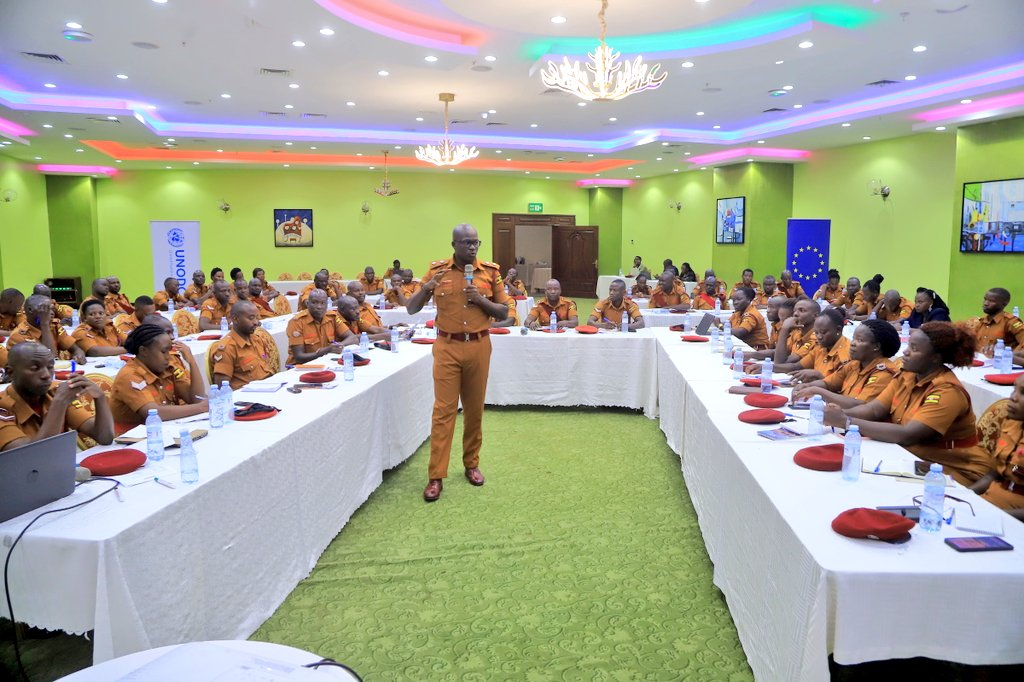Uganda Prisons Service, in partnership with the United Nations Office on Drugs and Crime and European Union has trained prisons officers to strengthen efforts in managing violent extremist prisoners, preventing radicalization to violence and enhancing human rights in prisons.
The training, which kicked off at Imperial Royale Hotel, Kampala, and will conclude on Friday June 28th 2024 brought together 80 participants from various prisons in the Kampala Extra, Central, and North Central Regions, including Upper, Murchison Bay, SSU, Luzira Women, Kampala Remand, Kigo, Kitalya Mini Max, Kitalya Farm, Kasangati, Butuntumula, and Nakasongola Prisons.
Ms. Brenda Sana, Commissioner of Prisons (Commandant – PATS), presided over the opening ceremony and emphasized the importance of proper rehabilitation and reformation of Violent Extremist Prisoners (VEPs). She cautioned the officers on maintaining integrity while working in prisons and encouraged them to ask questions, share, and learn from each other during the training.
The training program for prison officers is ongoing at Imperial Royale Hotel, Kampala, it is equipping them with skills to prevent radicalization and violent extremism in prisons. The officers are learning how to identify and support vulnerable inmates, challenge harmful ideologies, and create a safe and secure environment.
They also gained knowledge on alternative narratives, counseling techniques, and rehabilitation strategies to counter extremist influences.
The training is part of a broader effort by the government of Uganda Uganda Prisons UNODC and European Union in Uganda to enhance prison management, improve staff capacity, and promote inmate rehabilitation. The initiative aims to reduce the risk of violence and terrorism and promote safer communities.
By understanding the signs of radicalization and how to address them, prison officers can play a crucial role in preventing the spread of violent extremism and keeping communities safe.
The training program also aims to enhance the capacity of prisons officers to manage VEPs, prevent radicalization, and promote human rights in prisons.
This will be achieved by establishing various centers countrywide to facilitate the training and developing Prisons Intelligence Platforms to prevent violent extremism, with all prisons in Uganda set to benefit from the initiative.
In the training, the participants gained insights into international frameworks and guidelines for preventing radicalization and violent extremism in prisons. They learned about the UN Standard Minimum Rule on treatment of offenders, the Ankara Memorandum, the Rome Memorandum, and the UN Counter-Terrorism Strategy.
Rehabilitation of prisoners is a collective effort that requires the active participation of every prison officer.
By understanding international standards and best practices, participants will be empowered to contribute to the development of effective rehabilitation programs, fostering a safer and more secure prison environment.
Mr. Muhurizi Papus, Superintendent of Prisons, coordinator of the program, emphasized the significance of the training, highlighting that the greatest achievement is having trainers who are uniformed prison officers, a departure from the past where consultants dominated. He affirmed the core mandate of Uganda Prisons as ensuring the safe, secure, and humane custody of offenders, and urged the officers to prioritize reformation, rehabilitation, and reintegration of inmates in their daily roles.
Congratulating the officers on their selection to participate in the course, he encouraged them to live up to the task bestowed upon them, emphasizing the importance of detecting security risks in their units. He assured them that they will be trained in best practices to enhance their capacity to prevent radicalization and violent extremism in prisons.








